Summary Overview
Procurement Intelligence Povidone Iodine API Market Overview
The global povidone iodine market is experiencing significant growth driven by its expanding use in healthcare applications, including antiseptics, disinfectants, and wound care products. Increasing awareness about infection prevention and the rising demand for sterilization in healthcare facilities are major growth drivers. The market also benefits from the expanding use of povidone iodine in veterinary care and aquaculture, further diversifying its applications.
Our analysis highlights procurement trends that focus on cost optimization through supplier collaboration, demand forecasting, and digital procurement solutions. These strategies enable stakeholders to navigate price volatility influenced by raw material costs, global demand shifts, and transportation disruptions.
Key Market Insights
-
Market Size and Growth:The global povidone iodine market is expected to reach USD 2.7 billion by 2032, with a compound annual growth rate (CAGR) of 4.5% from 2024 to 2032.
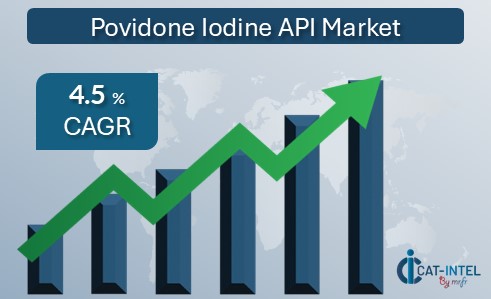
- Sector Contributions:
-
Healthcare: The largest segment, driven by povidone iodine's use in wound management and infection prevention. -
Veterinary and Aquaculture: Growing applications for disinfection and water treatment. -
Industrial Applications: Utilization in sanitation processes and pharmaceutical formulations.
-
Regional Insights:North America and Europe dominate the market due to high healthcare standards and robust veterinary practices. The Asia-Pacific region is anticipated to exhibit the fastest growth, fuelled by increasing investments in healthcare infrastructure and rising awareness of infection control.
Growth Drivers
-
Healthcare Demand: Rising focus on infection control in hospitals and clinics. -
Technological Advancements: Innovations in formulation to enhance efficacy and reduce side effects. -
Regulatory Approvals: Support from government agencies to improve healthcare accessibility and sanitation. -
Export Opportunities: Emerging markets are opening opportunities for manufacturers in established markets.
Overview of Market Intelligence Services for the Povidone Iodine Market
The market faces challenges such as price volatility due to fluctuating raw material costs and supply chain disruptions caused by geopolitical events or pandemics. However, leveraging digital procurement tools and advanced forecasting models enables stakeholders to mitigate risks and maintain supply chain stability.
Procurement Intelligence for API Povidone Iodine Market: Category Management and Strategic Sourcing
To stay competitive in the API Povidone Iodine market, companies are refining procurement strategies to manage costs and ensure consistent supply. Leveraging spends analysis tools for better vendor evaluation and adopting supply market intelligence are critical steps in enhancing supply chain efficiency. Strategic sourcing and category management are pivotal for optimizing procurement efforts, enabling firms to secure high-quality API Povidone Iodine at competitive prices while mitigating risks associated with supply chain disruptions and price volatility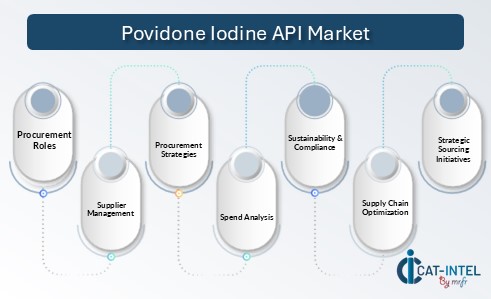
Pricing Outlook for Povidone-Iodine API Market: Spend Analysis
The Povidone-Iodine Active Pharmaceutical Ingredient (API) market exhibits a steadily increasing cost trajectory driven by rising production expenses, stringent regulatory requirements, and expanding applications across the healthcare and pharmaceutical sectors. Key price influencers include the increasing demand for antiseptic formulations, supply chain complexities, and growing investments in R&D for innovative medical applications.Pricing Outlook for the Povidone-Iodine API Market from 2024 to 2032, shown in the line chart
The Povidone-Iodine API market is poised for sustained price growth, fuelled by increasing global demand for antiseptics and disinfectants, particularly in the healthcare and pharmaceutical sectors. Factors such as heightened awareness of hygiene, rising healthcare infrastructure investments, and ongoing advancements in manufacturing technology contribute to the upward price trajectory. Geographically, developed markets exhibit stable but premium pricing due to stringent regulatory standards, while emerging markets offer competitive pricing but are witnessing faster growth. Procurement strategies focusing on long-term supplier relationships, bulk purchasing agreements, and cost-efficient production techniques are essential to mitigate rising costs and ensure a reliable supply chain.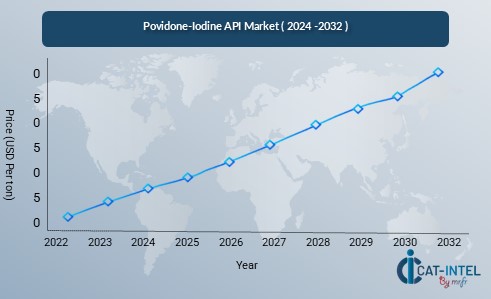
Cost Breakdown for the Povidone-Iodine API Market: Total Cost of Ownership and Cost saving opportunities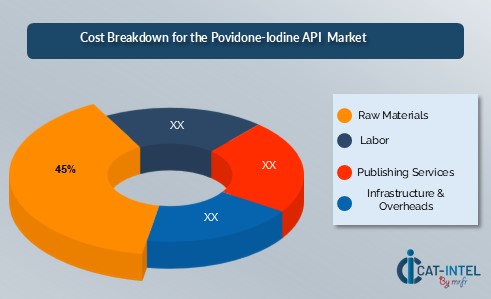
-
Raw Materials (45%)Description: Covers the procurement of core ingredients such as povidone and iodine, along with essential additives used in manufacturing pharmaceutical antiseptics. Price fluctuations in iodine, driven by limited global sources and geopolitical uncertainties, significantly impact this cost component.Trends: Escalating iodine costs are prompting manufacturers to seek cost-effective sourcing strategies while maintaining quality compliance
.2. Labor (XX%)
- Manufacturing Overheads (XX%)
- Distribution and Logistics (XX%)
Cost Saving Opportunity: Negotiation Levers and Purchasing Negotiation Strategies
In the Povidone Iodine API market, optimizing procurement processes can significantly reduce costs and enhance operational efficiency. Key negotiation strategies include securing long-term contracts with suppliers of iodine and povidone to stabilize raw material costs amidst fluctuations. Bulk purchasing or pooling demand with other pharmaceutical manufacturers can also drive down per-unit costs. Additionally, focusing on local suppliers can mitigate transportation and import duties, further cutting down costs.
Supply and Demand Overview of the Povidone Iodine API Market: Demand-Supply Dynamics and Buyer Intelligence for Effective Supplier Relationship Management (SRM)
The Povidone Iodine API market is expanding due to rising demand in the healthcare, pharmaceutical, and personal care sectors. The increased focus on infection control, particularly in surgical settings, and the growing demand for antiseptic solutions in wound care, contribute to a robust market outlook.
Demand Factors:
-
Increasing Healthcare Needs: The rising incidence of infections, particularly in hospitals and clinics, drives demand for antiseptic solutions, particularly povidone iodine. -
Expanding Applications in Personal Care: The surge in consumer interest in personal hygiene products, including hand sanitizers and skincare, is pushing the demand for povidone iodine formulations in over-the-counter products. -
Government Initiatives: Governments across the globe are increasing funding for healthcare and infection control initiatives, driving the adoption of povidone iodine in medical and clinical settings. -
Rising Surgical and Hospital Procedures: With the growing number of surgical and medical procedures worldwide, there is an increased demand for reliable antiseptics like povidone iodine, which plays a crucial role in preoperative care.
Supply Factors:
-
Limited Raw Material Sources: The supply of iodine, one of the key components of povidone iodine, is influenced by geopolitical factors and limited geographical sources, creating fluctuations in the supply chain. -
Manufacturing Innovations: New technologies and production methods are enhancing the efficiency of povidone iodine manufacturing, increasing its availability and reducing costs. -
Global Supplier Network: International collaborations and the establishment of global supply chains for raw materials and finished products ensure that the market has a steady supply of povidone iodine. -
Regulatory Requirements: Stringent pharmaceutical regulations ensure that only high-quality povidone iodine is produced and marketed, influencing supply chain dynamics and pricing structures.
Regional Demand-Supply Outlook: Povidone Iodine API Market
The image shows growing demand for in Povidone Iodine API Market in both North America and Asia, with potential price increases and increased competition.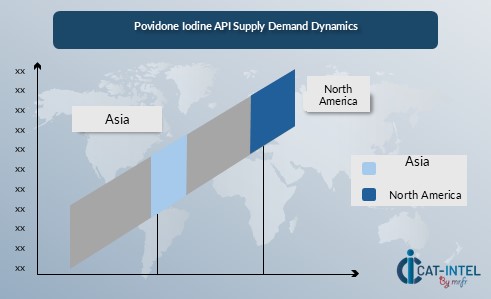
North America: Leadership in Povidone Iodine API Market
North America, particularly the U.S. and Canada, maintains a significant role in the Povidone Iodine API market, highlighted by:
-
Advanced Healthcare Systems: North America is home to some of the largest healthcare and pharmaceutical markets, which consistently drive demand for high-quality antiseptic products like Povidone Iodine. -
Government Support and Regulations: U.S. and Canadian government bodies, such as the FDA and Health Canada, regulate and monitor the production of Povidone Iodine, ensuring high-quality standards and market growth. Additionally, public health initiatives focusing on infection control support sustained demand for Povidone Iodine. -
Strong Pharmaceutical Industry: A robust pharmaceutical ecosystem in North America, with key players like Pfizer and Johnson & Johnson, increases the demand for APIs like Povidone Iodine used in a range of therapeutic areas, especially in wound care and infection prevention. -
R&D Investment and Technological Advancements: Ongoing investments in medical research and technological advancements continue to propel North America as a leading innovator in antiseptic solutions. The development of new formulations for Povidone Iodine, such as higher concentration solutions for surgical disinfection, is helping maintain market relevance. -
Global Influence: North American companies are influential globally, shaping the global standards for quality and regulatory compliance. Their strong market presence provides opportunities for international stakeholders to enter the region with confidence, ensuring Povidone Iodine remains essential in global healthcare practices.
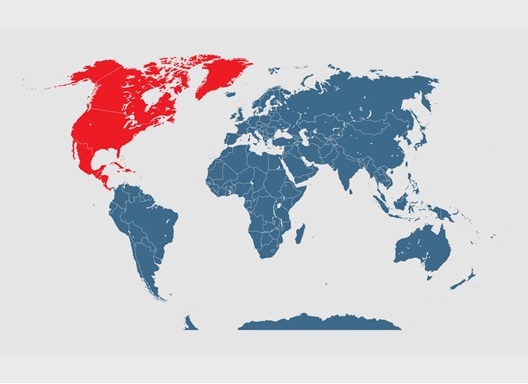
North America remains a key hub Povidone Iodine API Market innovation and growth
Supplier Landscape: Supplier Negotiations and Strategies in the Povidone Iodine API Market
The supplier landscape in the Povidone Iodine API market is diverse and competitive, with several global and regional suppliers contributing to the manufacturing and supply of this essential antiseptic. The market is marked by significant demand from pharmaceutical companies, healthcare institutions, and manufacturers of personal care products, which drive the need for high-quality Povidone Iodine APIs. Supplier negotiations and strategies are crucial in maintaining cost-effectiveness, ensuring high-quality production, and meeting the evolving demand in global healthcare markets.
Key suppliers in the Povidone Iodine API market include:
- Hubei Xinjing
- Yichang Sanxian Pharmaceutical Co.
- MacLeods Pharmaceuticals
- Zhejiang Aoxing Pharmaceutical Co., Ltd.
- Hunan Hengsheng Pharmaceutical Co., Ltd.
- Shaanxi Top Pharm Chemical Co., Ltd.
- Medisca
- Wuhan Grand Hoyo Co., Ltd.
- Jiangsu Xinjiang Pharmaceutical Co., Ltd.
- Lianhetech
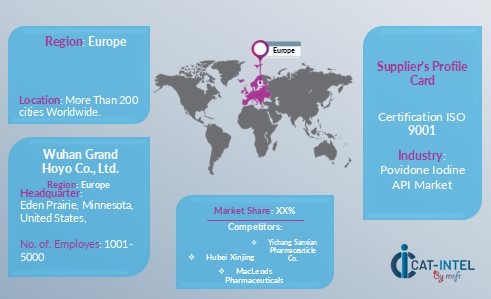
Key development: Procurement Category Significant Developments
Category |
Development |
Impact |
|
Supplier Consolidation |
Leading pharmaceutical companies are merging and acquiring regional suppliers. |
Results in market dominance by a few large suppliers, improving efficiency and resource management. |
|
Regulatory Compliance |
Increasing demand for higher regulatory standards for Povidone Iodine APIs. |
Ensures better product quality, compliance with FDA/EMA, and strengthens market credibility. |
|
R&D Investments |
Suppliers are investing in R&D to enhance Povidone Iodine formulations. |
Drives innovation in formulations, stability, and application, maintaining competitive advantage. |
|
Quality Control |
Emphasis on strict quality control measures and certifications. |
Enhances product reliability, reduces recalls, and supports premium pricing strategies. |
|
Cost-Effective Procurement |
Suppliers are focusing on streamlining production and supply chains. |
Reduces overall costs for manufacturers and healthcare providers, improving affordability. |
|
Technological Advancements |
Adoption of automation and AI in production processes. |
Leads to improved efficiency, reduced costs, and faster production cycles. |
|
Sustainability Initiatives |
Focus on eco-friendly production and packaging solutions. |
Aligns with global sustainability trends, improving brand image and compliance with environmental standards. |
|
Market Expansion |
Regional suppliers are expanding into emerging markets like India and Africa. |
Increased market share and access to new revenue streams, especially in developing regions. |
|
Procurement Attribute/Metric |
Details |
Market Sizing |
The API Povidone Iodine market is projected to grow from USD 950 million in 2024 to USD 2.7 billion by 2032, with a CAGR of4.5% (2023-2032). |
Research Technology Adoption Rate |
55% of pharmaceutical companies are adopting automated systems for inventory management and batch production to enhance production efficiency in API manufacturing. |
Top Research Strategies for 2024 |
Focus on improving product purity, adopting sustainable manufacturing practices, and leveraging digital tools for better quality control. |
Research Process Automation |
50% of production processes for Povidone Iodine APIs are automated, including formulation and quality testing procedures. |
Research Challenges |
Key issues include fluctuating raw material prices, stringent regulatory requirements, and the rising costs of quality assurance testing. |
Key Suppliers |
Leading suppliers include: |
1. Hubei Xinjing Chemical |
|
2. Ashland Global Holdings Inc. |
|
3. BASF |
|
4. Shandong Xinhua Pharmaceutical Company |
|
5. Shaanxi Top Pharm Chemical Co., Ltd. |
|
Key Regions Covered |
North America, Europe, Asia-Pacific, with China, the U.S., and India being major suppliers and consumers in the market. |
Market Drivers and Trends |
Growth driven by increasing demand for antiseptics in healthcare, rising awareness about infection control, and the growing need for effective wound care solutions. |










